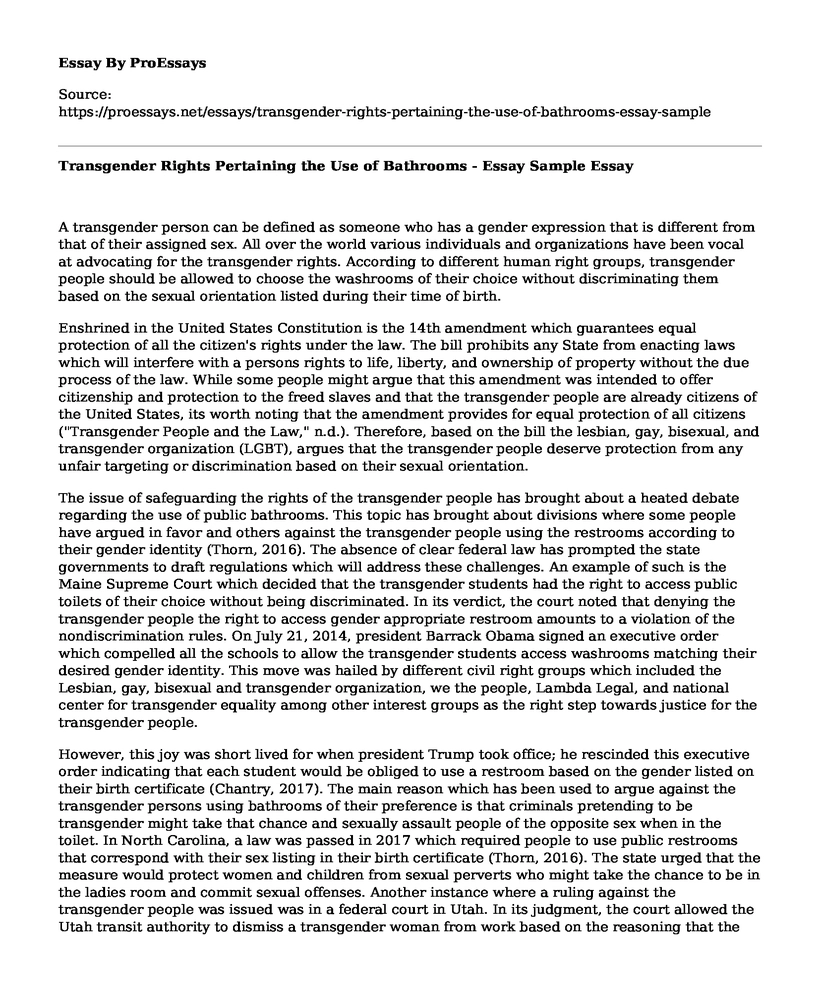A transgender person can be defined as someone who has a gender expression that is different from that of their assigned sex. All over the world various individuals and organizations have been vocal at advocating for the transgender rights. According to different human right groups, transgender people should be allowed to choose the washrooms of their choice without discriminating them based on the sexual orientation listed during their time of birth.
Enshrined in the United States Constitution is the 14th amendment which guarantees equal protection of all the citizen's rights under the law. The bill prohibits any State from enacting laws which will interfere with a persons rights to life, liberty, and ownership of property without the due process of the law. While some people might argue that this amendment was intended to offer citizenship and protection to the freed slaves and that the transgender people are already citizens of the United States, its worth noting that the amendment provides for equal protection of all citizens ("Transgender People and the Law," n.d.). Therefore, based on the bill the lesbian, gay, bisexual, and transgender organization (LGBT), argues that the transgender people deserve protection from any unfair targeting or discrimination based on their sexual orientation.
The issue of safeguarding the rights of the transgender people has brought about a heated debate regarding the use of public bathrooms. This topic has brought about divisions where some people have argued in favor and others against the transgender people using the restrooms according to their gender identity (Thorn, 2016). The absence of clear federal law has prompted the state governments to draft regulations which will address these challenges. An example of such is the Maine Supreme Court which decided that the transgender students had the right to access public toilets of their choice without being discriminated. In its verdict, the court noted that denying the transgender people the right to access gender appropriate restroom amounts to a violation of the nondiscrimination rules. On July 21, 2014, president Barrack Obama signed an executive order which compelled all the schools to allow the transgender students access washrooms matching their desired gender identity. This move was hailed by different civil right groups which included the Lesbian, gay, bisexual and transgender organization, we the people, Lambda Legal, and national center for transgender equality among other interest groups as the right step towards justice for the transgender people.
However, this joy was short lived for when president Trump took office; he rescinded this executive order indicating that each student would be obliged to use a restroom based on the gender listed on their birth certificate (Chantry, 2017). The main reason which has been used to argue against the transgender persons using bathrooms of their preference is that criminals pretending to be transgender might take that chance and sexually assault people of the opposite sex when in the toilet. In North Carolina, a law was passed in 2017 which required people to use public restrooms that correspond with their sex listing in their birth certificate (Thorn, 2016). The state urged that the measure would protect women and children from sexual perverts who might take the chance to be in the ladies room and commit sexual offenses. Another instance where a ruling against the transgender people was issued was in a federal court in Utah. In its judgment, the court allowed the Utah transit authority to dismiss a transgender woman from work based on the reasoning that the employer could be sued because of her employees action of using the public restroom on her bus route.
In conclusion, I think this is a sensitive topic with both sides having valid arguments. The rights of the transgender people ought to be protected under the law, while at the same time safety of other people when accessing the public washrooms should be guaranteed. In my opinion, the government should change the law to include gender-neutral bathrooms for public access in all the public places and institutions. These toilets should be availed together with the traditional ladies and gents washrooms so that those wishing to visit the gender-neutral restrooms can do so without fear of discrimination. In this way, the public toilets will be safer and more welcoming to everyone.
References
Chantry, K. (2017, February 23). The transgender bathroom controversy: Four essential reads. Retrieved from http://theconversation.com/the-transgender-bathroom-controversy-four-essential-reads-72635
Thorn, R. (2016, June 8). Toilets and transgender rights. Retrieved from http://www.bbc.com/news/uk-england-36395646
Transgender People and the Law. (n.d.). Retrieved from https://www.aclu.org/know-your-rights/transgender-people-and-law
Cite this page
Transgender Rights Pertaining the Use of Bathrooms - Essay Sample. (2021, Sep 02). Retrieved from https://proessays.net/essays/transgender-rights-pertaining-the-use-of-bathrooms-essay-sample
If you are the original author of this essay and no longer wish to have it published on the ProEssays website, please click below to request its removal:
- Communication Experience
- Essay on Use of Kinesics in People's Interaction
- Gender Roles and Gender Inequality Essay
- Essay Sample on Step-Parenting Issues
- Why Can Americans Drive at 16 but Drink at 21 Paper Example
- Essay Example on Neurotic Society: Anxiety, Mental Illness & Personality Impairment
- The Pilgrim's Journey: A Political & Social Analysis of John Bunyan's Classic - Essay Sample







